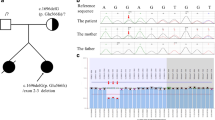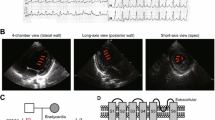Abstract.
Bartter syndrome, an autosomal recessive renal tubular disorder, is associated with hypokalemic metabolic alkalosis with high renin and aldosterone plasma concentrations with low or normal blood pressure and renal salt loss. Two genes, the gene encoding the furosemide-sensitive apical Na-K-2Cl cotransporter (NKCC2) and the gene encoding the luminal inwardly-rectifying potassium channel Kir 1.1 (ROMK), have been reported to cause the neonatal subtype of Bartter syndrome. In a patient with neonatal Bartter syndrome, we report two novel mutations resulting in amino acid exchanges Ala156Val and Leu220Phe in the gene for Kir 1.1 that have been identified by single-strand conformation polymorphism analysis and subsequent direct sequencing. Both mutations occur in functional relevant domains of the channel protein and are therefore highly suggestive of altering channel properties.
Similar content being viewed by others
Author information
Authors and Affiliations
Additional information
Received October 29, 1997; accepted November 6, 1997
Rights and permissions
About this article
Cite this article
Vollmer, M., Koehrer, M., Topaloglu, R. et al. Two novel mutations of the gene for Kir 1.1 (ROMK) in neonatal Bartter syndrome. Pediatr Nephrol 12, 69–71 (1998). https://doi.org/10.1007/s004670050408
Published:
Issue Date:
DOI: https://doi.org/10.1007/s004670050408




